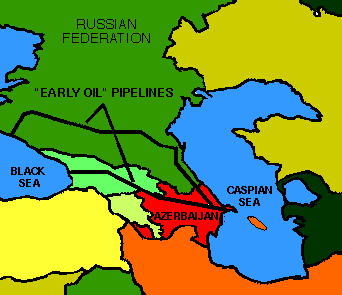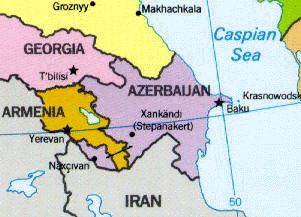
| ICE Case Studies
|
|
I.
Case Background |

Oil exploration in the Caspian Sea is accelerating at rapid speed. Once thought minimal, Caspian oil is now considered more prevalent than Persian Gulf oil. There is increased interest mounting with each new Caspian discovery; however, possible pipeline routes is an issue with the tensions between two Transcaucasian republics, Armenia and Azerbaijan. One viable route would be through Iran, although the United States is blocking any such effort. Another northern option would take crude oil from Kazakhstan through southern Russia to the Russian Black Sea port of Novorossiysk. The US, however, would like to bypass Russia, and prefers going through the Caucasus. Once the oil reaches the Black Sea, however, the problem is how to remove it. The most viable option would be the Bosporus, the narrow channel from the Black Sea to the Sea of Marmara, which passes through the heart of Istanbul. (See Bosporus case study). This route, however, has environmental implications; the Bosporus is dead water - there are frequent oil leaks from tankers working their way through the narrow straits. On March 13, 1994, a Cyprus registered tanker, the Nassia, collided with a freighter at the Black Sea entrance to the Bosporus, resulting in the closure of the strait to heavy traffic for several days. (Roberts, 1996, 53).


Caspian oil has a history dating back to World War I. During this time, the Germans had turned to Baku, Azerbaijan, to replenish their exhausted fuel supplies. Baku, however, eventually fell to Soviet power. Unable to continue the war because of low fuel supplies, the Germans surrendered in November 1918 (Forsythe, 1996, 9). During World War II, Hitler wanted to use Caspian oil to fuel his army as well. In 1941, Hitler staged a campaign to take over the region as well as its mineral reserves. In 1942, Hitler declared that if he failed to seize the Caucuses, he would be forced to end the war. The mountainous terrain, the strength of Soviet forces, and the exhaustion of the German army contributed to the defeat of the Germans in their quest for the Caucasus (Forsythe, 1996, 10).
Currently, there is great interest in extracting oil in the Caspian sea. The major cause of contention, however is what route the pipeline would travel out of the Caspian, and eventually out of the Black Sea. There are three proposed routes: 1) the Northern (or Russian) option; 2) the Central (or Caucasus) option, and 3) the Southern (or Iranian) option (Roberts, 1996, 8)
The Northern option is the most viable alternative. Oil would travel through southern Russia. The US, however, would prefer bypassing Russia, and alternatively going through the Caucasus. This presents a problem in itself. The Central, or Caucasus, option is politically unstable. Oil would traverse from Azerbaijan to either Georgia, Turkey, or Armenia. The ongoing conflict between Armenia and Azerbaijan regarding the Armenian enclave of Nogorno-Karabakh makes this an unstable option. Turkey has closed its border to Armenia, as has Azerbaijan. The third route, going South by way of Iran, has been unfeasible for US interests, considering tensions between Teheran and Washington, although the US has recently made concessions (see below).
Turkey had previously championed the route through Armenia, as it had hoped it would bring peace to Armenia and Azerbaijan. The shortest route for an oil line from Baku to Turkey would lie along the Aras river, which would entail cutting through the Armenian Republic, where it would continue to travel further up the Aras into Turkey. Turkey had hoped the construction of the pipeline would be incentive for a solution of the Karabakh conflict. The United States had actively tried to instigate some sort of peace agreement between the two countries as well, in interest of oil, if nothing else.
Russia is currently calling "foul play" in regard to who has the right to Caspian oil. The economic presence of China, Turkey, Iran and other states in Central Asia is expanding, and from the point of view of Russian politicians and analysts, Russia's patience is reaching its limit as foreign states increase their interests in an area which she once called her own (Kasenov). Russia, disturbed that Caspian potentiality was not recognized when the region was a part of the Soviet Union, is now referring back to laws written in 1921 and 1940. Russia claims the laws are still in effect, which hold that Iran and the Soviet Union have the rights to a ten mile coastal fishing zone with shared jurisdiction over the rest of the Caspian. It rejects the 1982 international convention on the Law of the Sea, which states that landlocked seas can be carved up among the countries that border them. These debates, however, are irrelevant. The 1921 and 1940 treaties contained no reference to borders between the then union republics. They could not have done so, because under Soviet law, border regimes were explicitly under federal jurisdiction. Consequently, there would be no borders between the union republics, regarding the Caspian Sea because the entire sea was federal and the republics, including Russia, had no powers regarding the delimination of the Caspian Sea (Uibopuu).
The United States is willing to dispute Russia's claim, as it holds an inherent interest in Caspian oil. First, the US would like to reduce dependence on the Persian Gulf, and Caspian oil would make such an intention feasible. Second, the US supports its own commercial involvement in the region. Third, the US would like to promote the sovereignty and independence of the countries in the region (Forsythe, 1996, 17). The United States is also hindered in its involvement in the situation between Armenia and Azerbaijan because of the Freedom Support Act, which in 1992, included a provision barring aid to the government of Azerbaijan until it "takes demonstrable steps to cease the blockade and other uses of force against the people of Armenia and Nagorno-Karabakh." The U.S. government, however, is considering repealing this provision, as it limits US ability to be an effective intermediary. Achieving a peace settlement between Armenia and Azerbaijan is the key to promoting US interests in the region. Peace will allow for the development of the region's energy resources, and the US has its eye on Azerbaijan's billion barrels of proved and probable oil reserves that are roughly equal to those of Kuwait (Hamilton).
Pipeline security is a viable issue, concerning the volatility in the region. Political action, however, and not terrorism, is usually the cause of pipeline cutoffs. In the Caspian context, the prevalent worry is the ability of military groups to either prevent the line from being built in the first place, or to contribute to a much larger conflict which might make the region as a whole a dangerous place to develop energy resources (Roberts, 1996, 23). The future of the pipeline will depend on the relations of the actors involved.
Continent: Europe
Region: Eastern Europe
Country: Russia



IV. Environment and Conflict Overlap
Amoco Group Wins Azerbaijan Caspian Tract Oil and Gas Journal, December 23, 1996, p. 32
Forsythe, Rosemarie The Politics of Oil in the Caucasus and Central Asia Adelphi Paper 300 Oxford University Press, London, 1996
Goble, Paul. "Central Asia: Analysis from Washington - No Light at the End of the Tunnel" RFE/RL, July 29, 1997.
Gordon, Michael. US Sending Envoys to Seek Peace in Armenian-Held Region The New York Times, March 14, 1996
Hamilton, Lee H. "Toward Peace in the Caucasus" Christian Science Monitor, July 23, 1997.
Heusser-Markun, Regula. Swiss Review of World Affairs, n.2, February, 1994.
Kasenov, Oumerserik. "Russia and Transcaucasia: Oil, Pipelines, and Geopolitics"
Lelyveld, Michael S. Chevron Downplays Massive Caspian Oil and Gas Find, Mostly to Deaf Ears Journal of Commerce; v.410, n. 28836, 961024, p.1A
Platt, Anne. "Reversing Our Path of Destruction". People and the Planet v. 4, n.2, 1995.
Roberts, John Caspian Pipelines The Royal Institute of International Affairs, London, 1996
Uibopuu, Henn-Juri. "The Caspian Sea: a Tangle of Legal Problems" The World Today, v. 51, n.6, June 1995
